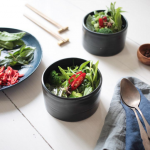 Photo: @earthtotablebondi Instagram
Photo: @earthtotablebondi Instagram
Are all those raw vegan desserts making you fat?
You’re doing all the right things. You’ve said goodbye to processed food, you’re spending a small fortune on superfoods and you’re dedicating your time to creating meals brimming with healthy ingredients. But you’re still not losing weight. What gives?
The answer could be in all those healthy, raw, vegan desserts you’re eating. Louise Cavanough, nutritionist at Health Space Clinics says that as more people are embracing a diet of whole food and healthy fats, she is seeing lots of cases of people going overboard on healthy desserts.
“While it is great that we now have these unrefined options so readily available, they still have to be treated as what they are – treats!” she says. “Not only are healthy desserts high fat, but they also contain significant amounts of sugar. Unrefined sugar, sure, but it will still spike your blood sugar and raise insulin, and if you don’t use it for energy, it will still end up being stored as fat.”
With many raw desserts sweetened with ingredients such as dates, which contain more than one third fructose and have a total sugar content over 60%, Louise says it’s the sugar content that poses the greatest danger to your health and weight maintenance, even if it comes in a ‘healthy form’.
“If the sugar is not being used effectively for energy, it will be converted to fat and stored, especially in the liver and around the abdomen,” says Louise. “High sugar diets are the direct cause of non-alcoholic fatty liver disease (NAFLD) – which is the most common chronic liver disease in Western countries. Concurrent insulin resistance and metabolic syndrome are also common, which eventually lead to diabetes type 2.”
Sugar aside, fats are another consideration when it comes to healthy desserts. While we now know that healthy fats are essential to a well-balanced diet, Louise stresses that the amount of energy we’re consuming always needs to be taken into consideration.
“A lot of the ingredients in healthy desserts – especially the superfoods like cacao, chia, and acai – are wonderful additions to the diet, you have to be aware that you are taking in large amounts of energy with them if you’re always having them as a dessert.”
Louise suggests adding these superfoods to a smoothie as a “less energy-dense way to have these nutrients on a regular basis.”
So how much good fat is it safe to consume? Louise says it’s really a very personalised requirement. “Everybody is different – activity level plays a part, as does genetics and individual constitution. Some people lose weight easily on a diet that is relatively high in fat, as long as their carbohydrate intake is kept low, while for others, this won’t work. Everyone needs to use up the energy they take in to lose weight – so if you are eating lots of energy dense foods (like healthy desserts), on regular basis – you better be willing to have the activity level to match!”
Now, nobody is suggesting you should deny you should deny yourself the occasional sweet treat. “You don’t want to completely deprive yourself and wind up bingeing later as a result,” cautions Louise. However, for many of us, it’s the ‘occasional’ part that we struggle with. If you find that you’re getting cravings for sweet foods on a daily basis, Louise suggests going cold turkey for a period to lose that dependence.
“You can ‘re-set’ your sweet tooth by avoiding sugar all together for a couple of weeks. This time off allows blood sugar to balance out, which can help with cravings. A lot of people find they don’t need to indulge in desserts the way they used to after that.”
For those of us trying to moderate our weight, the content of your raw desserts should be chosen with care.
If you’re looking for a healthy sweet snack to have for an occasional treat that ticks all these boxes, Louise says you can’t go past a small protein ball for a macronutrient balanced dessert.
“A ball that includes a high quality protein powder, with some nuts and superfoods and is sweetened with stevia, brown rice syrup, coconut syrup or dried fruit should be relatively balanced,” she says. “Otherwise, dark raw chocolate is my pick for the healthiest dessert, as it is rich in cardio-protective antioxidants, highly satisfying and relatively low in sugar. It doesn’t have the protein component of a protein ball but if you have had adequate protein with meals and snacks it is not essential at dessert.”
Liked this? Read these!
Got something to say? Get it off your chest here
The Juice Daily and Bodypass are Fairfax Media owned websites












